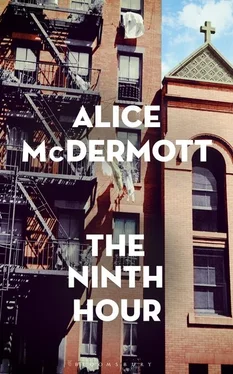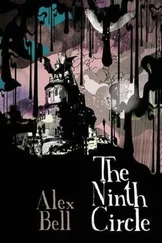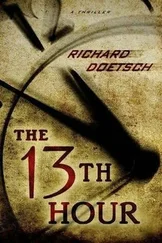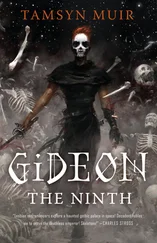Sally said, “No.”
Cautiously, he added, “She says you’re going back to your mother’s, though.”
Sally said, “I don’t know.” She was uncertain what Patrick understood about her mother’s situation. She imagined very little. It was hardly something Mrs. Tierney would discuss with a grown son. Hardly something a young man like Patrick would have any interest in. For the past few months, the family merely pretended, by some unspoken agreement, that Sally had taken their spare room in order to be closer to the hotel, although Mr. Tierney had gotten her the job in the tearoom only after Sister Lucy had brought her here, not before.
She put her hand on the tall glass of milk on the table. She said, “The lady I sometimes visit in the morning, Mrs. Costello,” and paused, “she passed away today while I was there.”
Patrick slumped in his chair, as if he had absorbed a soft blow. He blessed himself. “Sorry to hear that,” he said. “Was she ill?”
“She had pneumonia,” Sally said. And then added, “She was a one-legged woman. They had to take off her leg when a dog bite became infected. This was years ago. It made her somewhat touched.” And she touched her temple so he would understand.
Patrick drank from his glass again, and then lowered it reluctantly. He searched his memory for something, alighted on it, and then asked her, “Is this the milkman’s wife?” as if he had just put two and two together. He gestured toward the bottle on the drain board. It was clear from his expression that he was immediately uncertain if this was the proper question to ask.
Sally said, “That’s right.”
He nodded again. Resolved to set the conversation on a better track. Said, “My mother mentioned how nice you were to go sit with her. It couldn’t have been easy. One-legged and touched in the head, like you said.” And was pleased with himself.
Sally said, “No, it was not. Not always.”
Then they sat in silence. Two flights up, his father was snoring. Mr. Tierney could raise the roof on some nights. She saw Patrick glance at her, gauging her appreciation for the sound, embarrassed by it. It occurred to Sally that he was incapable of keeping anything out of his face, his eyes—clever as he was, you could read his every thought if you watched him carefully.
It was difficult to think of such a face gone still.
He said, “Did you ever hear my father’s story about Red Whelan? I mean, speaking of the one-legged among us.”
She said no, and so he told it.
He took the long way round with the tale, adding, as was his wont in those days when he was the brighter son, everything he knew about the history of the Civil War, the charms of the doorman’s trade, his parent’s storied romance, and that spring evening—dinnertime, the lilac bush at the dining room window not yet in bloom—when Red Whelan, his grandfather’s substitute in the war, knocked at the door.
And he ended it all with a flourish, indicating with a sweep of his right hand the tin ceiling of the kitchen and the fine five-bedroom house above it, as if the house, the brick and stone of it, proved the validity of all he had told her. As if the tale itself, only talk, only breath on air, had nevertheless brought them both to this solid and irrefutable present where they were alone together in the middle of the night, alone and awake and—true for him, at least—in love.
He gestured widely with his right hand at the end of all his talking, because in his left he held Sally’s thin fingers. They had, at long last, grown warm in his grip and he was reluctant to let them go.
OUR FATHER SAID, “After that, your mother’s life went from black-and-white to color. In my humble opinion.”
Her mother’s wedding in June. Although it was a brief weekday ceremony in the empty church, still there was lilac and lily of the valley. And then the shedding of those two apartments—one thick with paint and repaint, the other as sparse as a monk’s cell. They bought a brownstone in Liz Tierney’s neighborhood. Mr. Tierney himself providing a generous loan out of his “reparations.” Then—“just under the wire,” our father said, “all kinds of wires”—Annie, at forty-eight, giving birth to another daughter on a bright morning. Grace, they called her.
Sally pushed the child in the perambulator when Annie went back to the convent laundry to help out—there had been another young widow hired while Annie was in confinement, another young widow with a child who played on the floor.
Patrick Tierney joined her in these walks whenever he could—reminiscing, even then, about the charmed lives they had led as children, taken out every morning by their two mothers. The two empresses, he called them. Sally told him those days, her days as a convent child, were a pale dream when compared to the life she now lived: in a tall house with a baby sister and a mother who knew some leisure. And a father of sorts. Mr. Costello never could look her straight in the eye, but the apology he seemed always on the verge of offering made him both tongue-tied and tender in her presence. He grew dear to her.
The courtship that began on the long night that Patrick Tierney had talked and talked in his mother’s kitchen didn’t end until Grace headed off to school, and he finally found the courage to propose.
Sally was mourning the loss of the little girl’s steady presence in her days when he asked her, “How about some babies of your own?”
As inelegant a proposal, our father said, as any man has ever made.
* * *
WHEN OUR FATHER WAS VERY OLD—we were growing old ourselves—he told again the story he had told her that wet night, the story of his grandfather’s funeral, the train ride, the Irish maid behind the screen.
If your mother hadn’t come back from the nuns, our father said, that’s probably the girl I’d have married.
He remembered once more his father’s chestnut mustache and his trim suit, his flask of whiskey. And then his father’s tears in the dark hours of that dreadful night. Love’s a tonic, his mother had said, not a cure.
Old Red Whelan.
We were gathered in our father’s room. His own lifetime across a dozen different tenements, a fine house with five bedrooms, the tumbledown site of our own happy childhoods, now compressed into a bedroom and a bath and a small kitchenette, his days now confined to the high-rise facility he had selected for himself after our mother died, selected with a bachelor’s care: something simple and sparse and his alone.
He had begun to remind us, without the least prompting, that he’d had a good life, repeating the tales of his crowded childhood, his elegant father, his mother, who was as sharp as a knife.
Our mother, who thought to be a nun, but then thought better of it. “St. Saviour, you know, was her baptismal name.”
A fatherless girl, a convent child in white wool. The girl he always knew he would marry.
Growing old ourselves, we indulged him. We listened to the same stories told again and kept silent about the truth: that our mother’s midlife melancholy was clinical depression, unspoken of in those days.
That Great-aunt Rose’s happy tremor as we guided her up the stairs was surely the Parkinson’s that had visited us as well.
That the holy nuns who sailed through the house when we were young were a dying breed even then. The Bishop with his eye on their rich man’s mansion even then. The call to sanctity and self-sacrifice, the delusion and superstition it required, fading from the world even then.
We asked, And how much would they have paid him—Red Whelan—because it was history we were talking about so comfortably, here at the end of our father’s days and the new waning of our own. History was easy: the past with all loss burned out of it, all sorrow worn out of it—all that was merely personal comfortably removed.
Читать дальше










